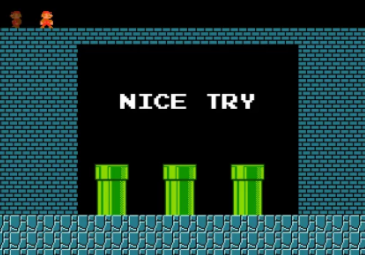Owner of ROM site represents himself in court, gets obliterated
He's now on the hook for $2.15 million.

Facing a multi-million dollar lawsuit from one of the biggest gaming companies in the world, plucky Los Angeles resident Matthew Storman decided it would be a good idea to represent himself. The results... were predictable.
Storman owned and operated a site called RomUniverse until summer 2020, when it was shut down following a lawsuit from Nintendo—which owned many of the ROMs being hosted—claiming mass copyright infringement. Storman wasn't just hosting the content, but directly profiting from it by offering premium memberships that allowed unlimited downloads (thanks, TorrentFreak).
"This is a straightforward video game piracy case, and the material facts are undisputed,” Nintendo's solicitors argued to the court. “For over a decade, defendant Matthew Storman owned and operated the website RomUniverse.com. He populated the website with pirated copies of thousands of different Nintendo games and distributed hundreds of thousands of copies of those pirated games."
Nintendo asked for a summary judgement against Storman and a combined $15 million dollars in damages
Representing himself against these allegations, Storman argued that the site broke no laws and the case should be dismissed. He claimed that RomUniverse didn't offer pirated Nintendo games, and that he'd never uploaded ROMs himself. This argument was undercut by the fact that, in a previous deposition, Storman had admitted doing just that.

Last week US District Court Judge Consuelo Marshall ruled on the matter, and did not agree with Storman. Not one bit.
"Defendant filed a declaration in opposition to the Motion wherein he declares that he 'denies and disputes that he uploaded any files to said website and at no time did he verify the content of said ROM file', which is directly contradictory to his sworn deposition testimony wherein he testified that he uploaded the ROM files onto his website," wrote Judge Marshall, going on to call this claim a "sham affidavit."
The biggest gaming news, reviews and hardware deals
Keep up to date with the most important stories and the best deals, as picked by the PC Gamer team.
Bit awkward. Storman had also previously testified that he profited from the site's premium accounts, saying that during 2019 the site made between $30,000 and $36,000 dollars, which was his primary income, and just before it closed in 2020 was making around $800 a month.
Unsurprisingly, Judge Marshall decided that Nintendo had proven copy infringement of various flavours, as well as trademark infringement. The court granted the motion for summary judgement, and "awards Plaintiff $1,715,000 in statutory damages under the Copyright Act and $400,000 in statutory damages under the Lanham Act for a total of $2,115,000 in statutory damages."
This was a lot less than the $15 million Nintendo's solicitors had pushed for. The judge also stopped short of granting a permanent injunction against Storman (because he'd already shut down the site), and refused further sanctions Nintendo has asked for. But you wouldn't exactly call this a win for Storman, whose "only source of income at the time of his deposition was unemployment and food stamps."

Rich is a games journalist with 15 years' experience, beginning his career on Edge magazine before working for a wide range of outlets, including Ars Technica, Eurogamer, GamesRadar+, Gamespot, the Guardian, IGN, the New Statesman, Polygon, and Vice. He was the editor of Kotaku UK, the UK arm of Kotaku, for three years before joining PC Gamer. He is the author of a Brief History of Video Games, a full history of the medium, which the Midwest Book Review described as "[a] must-read for serious minded game historians and curious video game connoisseurs alike."

